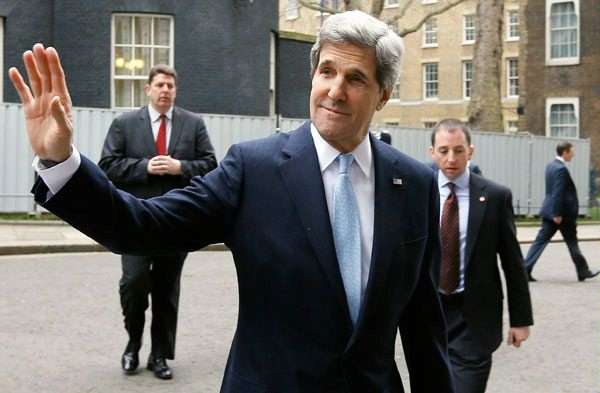Obama Nearly Blundered the U.S. Into a War. Will John Kerry Blunder Us Out of One?

The march to war in Syria has turned into a kind of farcical stumble. With his chemical weapons red line comments, President Obama nearly blundered us into a war. Now we get to wonder if an off-handed remark by Secretary of State John Kerry will somehow blunder us out.
Kerry's "proposal" that Syria could avert an attack by turning over its chemical weapons to the international community was delivered as a sarcastic remark. Kerry didn't think it was serious, or doable, and he said as much at the time.
Yet Russia and Syria reacted positively—and Obama said yesterday that he'd consider the idea. Now, with Russia playing middleman, Syria has reportedly agreed to officially declare its chemical weapons stockpiles and sign onto the worldwide anti-chemical weapons convention.
Well, that's interesting. Complicating matters, however, is Russian President Vladimir Putin's notion that the idea can only work if the U.S. completely gives up on the idea of force. Which U.S. Defense Secretary Chuck Hagel has said that America won't do—because only the threat of force will ensure that a Syrian chemical weapons drawdown succeeds. It's a chicken and egg problem, but with cruise missiles and sarin gas: Does Syria give up its chemical weapons first? Or does the U.S. withdraw the threat of force before Syria takes action?
Does it have a chance of averting strikes? Is it all just a stalling tactic on the part of Syria and its allies? A face-saving out for the White House? The best answer is…who knows? For now, however, all of the players are at least pretending it's a live option. The Senate has delayed a vote on the authorization of force. Obama is saying he'll consider the idea. Russia, Syria, France, and the U.N. are all playing along to some degree as well.
And here's the thing: Despite the absurdity of the sequence of events that led to this situation, it's not a half-bad deal in a lot of ways. As Dan Drezner argues at Foreign Policy:
First of all, this solves the inherent tension between Obama's goals in Syria. He really does want to enforce the chemical weapons taboo, and yet he really doesn't want either side to claim victory in the civil war. Essentially, this deal creates a liberal solution (Security Council resolution, Syria joining the Chemical Weapons Convention) to the liberal problem (enforcing the chemical weapons taboo). Richard Price would be proud. At the same time, minimizing the chemical weapons issue allows all the major parties in the conflict to do what they wanted to do anyway: revert to the pre-August 21 status quo.
Second of all, it's not like Obama was gaining much political traction with Congress or the American people or even the foreign policy community on this issue. Politically, this solves a brewing political fiasco and would permit both the executive and legislative branches to focus on other things like, you know, funding and staffing the U.S. government.
What about the problems? What if the Syrian government tries to evade the deal? The worst-case scenario is that, after a spell, we're back to where we are now -- with the benefit of the United States observing that it gave the UN route a fair shake. Diplomatically, that's still a win. This also holds, by the way, if the Syrian government defects and uses chemical weapons again.
On a very basic level, anything that removes even some chemical weapons from Assad's control while avoiding U.S. military involvement in a Syrian civil war is a huge improvement over the U.S. strikes that, until just a few days ago, looked inevitable.
We'll find out more about what the Obama administration is actually thinking when Obama addresses the nation tonight. Your favorite Reason staffers will be live-tweeting, so make sure to check in here.


Show Comments (46)